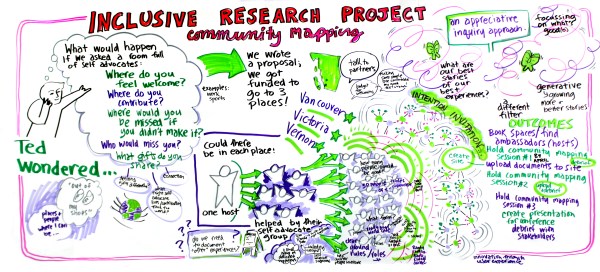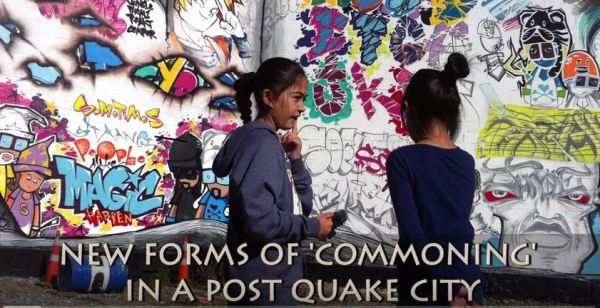The city as laboratory: what post-quake Christchurch is teaching us about urban recovery and transformation
Maja Moritz, CC BY-ND Kelly Dombroski, Massey University and Amanda Yates, Auckland University of Technology In the aftermath of a series of earthquakes that devastated Ōtautahi Christchurch 12 years ago, impromptu and transitional organisations kickstarted the city’s recovery. On the many vacant sites in the demolished city, they supported pop-up shops, installations and events to... Continue Reading →
International Women’s Day: Generation Equality and care work for everyone
Dr Kelly Dombroski Talk for UN Aotearoa International Women’s Day Brunch, 8 March 2020 Introduction International Women’s Day is a time to celebrate the women in your life, and it is great to see you all here doing that. The unspoken question here is why do we need a special day for women? Actually –... Continue Reading →
Six things I wish I had known before editing my first collection
I am currently working on the introduction to The Handbook of Diverse Economies with the wonderful Katherine Gibson. It is the last chapter of our 58 chapter handbook, and, as is often the case with introductions, it is flowing out of our fingers and an amazing rate! What an immense privilege it has been to... Continue Reading →
Collective Strategies for Deep Work
In a previous post reviewing Cal Newport's book Deep Work I promised I would write a post sharing more collective strategies for enabling deep work, in particular for people with heavy care-loads. I suggested that sometimes the consequences are different for women trying to draw a line around their deep work time, and I imagine... Continue Reading →
Arisan (rotating savings and credit group)
This entry appears on https://communityeconomiesasia.wordpress.com/. People can upload keywords or practices of community economy around Asia!
Keywords of Community Economies in Asia
Indonesia
Ririn Haryani and Kelly Dombroski
Arisan is a rotating credit system that has been present in Indonesia for over one hundred years. In contemporary times, arisan involves a regular meeting of a consistent group whereby each member contributes an equal amount of money or goods each meeting, and whereby a draw is held allowing one member to receive the combined sum of contributions. This rotates around the group until everyone has won. It is customary that the winner from the last round will provide the venue and snacks for the coming arisan round.
The practice is believed to have originally come from China through trade activities with the Orang Asli (indigenous Indonesians), even before the era of Western colonialism. The practice went through an acculturation process with local traditions and customs of helping each other, known as gotong royong. This means that arisan is more than economic exchange…
View original post 828 more words
Surviving Well Together
KELLY DOMBROSKI and STEPHEN HEALY describe a community economies approach to poverty which seeks to acknowledge what people are already doing in their communities to sustain themselves and then to act in solidarity with them. REPUBLISHED from Tui Motu Interislands Magazine. Many thanks to editor Ann Gilroy. How can we work to transform our economies... Continue Reading →
Beyond public intellectualism: moving from ‘matters of fact’ to ‘matters of concern’ in research
Last week I posted on being a public intellectual, or someone who engages with communities and society outside of academia, communicating research directly and also being influenced by communities in choosing research topics. I stand by all that. But I want to think further about the more theoretical work that community-engaged, public intellectual researchers do,... Continue Reading →
Being a Public Intellectual
Today I was interviewed by a PhD scholar researching 'public' geographers and public intellectuals more generally. I'm not sure if I was being researched as an actual public geographer, or as a group of people with views about public geography, but it did get me thinking about what we do and who we are aiming... Continue Reading →
Domestic Activists?
Women still do the majority of household caring labour. But not only this, women's caring labour has expanded to include care not just for families and their needs but also for the environment and sustainability. Some studies frame this as a form of inequality, another example of how the 'dirty work' of society gets lumped... Continue Reading →
Commoning in a post-quake city
As part of a new area of research, I'd love to share my new mini-doco with you all. It's about the new forms of 'commoning' that have arisen since the Christchurch earthquake sequence in 2010 and 2011. Of course, I wasn't here and don't know as much about it as all the amazing Christchurch people... Continue Reading →
Enacting a postcapitalist politics
So it has been quite a long time since I blogged -- mostly because the second half of 2015 was taken up with intense teaching and a return to fulltime work. Ironically, a lot of my research work is about how the home and domestic spaces are sites of enacting postcapitalist politics for different kinds... Continue Reading →
Gender, Personality, and Social change
I have recently been reading David Keirsey's book Please Understand Me II, having read Please Understand Me in the first edition many years ago. He uses the Myer-Briggs personality categories to describe four basic temperaments and 16 role variants. His main point is that much of our differences in communication and the way we interact... Continue Reading →
My Community Economies Work
I regularly update my profile on the Community Economies website. If you are interested in reading more of my work in this area, see my profile.














